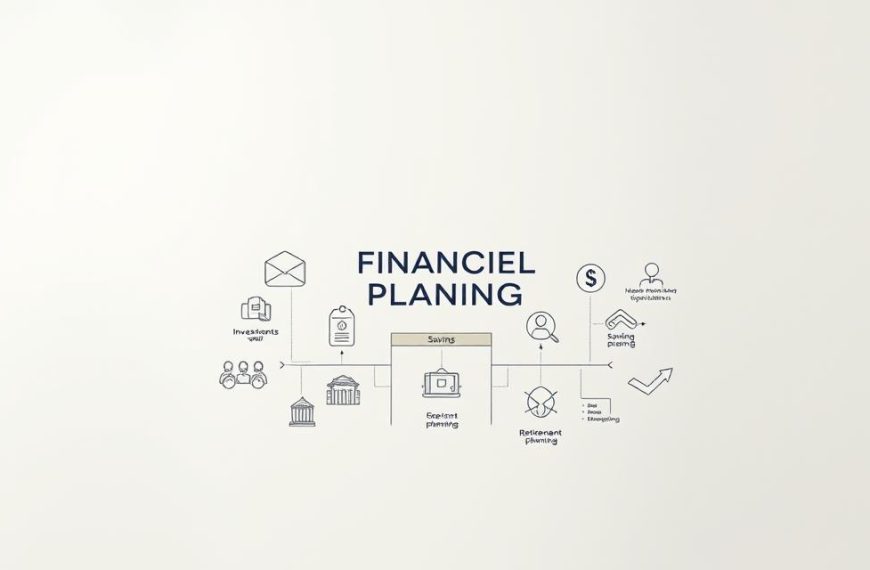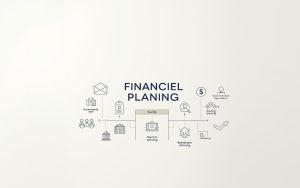In today’s complex financial landscape, adopting holistic financial planning can be a game-changer. This comprehensive approach considers all aspects of your financial life, rather than focusing on isolated components.
Unlike traditional financial planning methods, a holistic approach aligns with your personal values and priorities, helping you achieve both short-term and long-term goals. By taking a comprehensive view of your finances, you can make more effective decisions and enhance your overall financial wellbeing.
This guide serves as an introduction to the concept of holistic financial planning, setting the stage for a deeper exploration of its principles, components, and benefits.
Understanding Holistic Financial Planning
Understanding holistic financial planning requires a deep dive into its core principles and how it differs from traditional methods. Holistic financial planning is not just about managing finances; it’s about creating a comprehensive plan that integrates all aspects of one’s financial life.
Definition and Core Principles
Holistic financial planning is defined by its comprehensive approach, considering all facets of an individual’s financial situation. The core principles include understanding the client’s goals, values, and life circumstances to provide tailored financial advice. This approach ensures that financial decisions are made with the client’s overall well-being in mind.
How It Differs from Traditional Financial Planning
Traditional financial planning often focuses on specific areas such as investments or insurance in isolation. In contrast, holistic financial planning views a person’s financial situation as an interconnected ecosystem. The key differences are highlighted in the following table:
| Aspect | Traditional Financial Planning | Holistic Financial Planning |
|---|---|---|
| Approach | Siloed, focusing on specific financial products or areas | Comprehensive, considering all aspects of financial life |
| Client Understanding | Often based on standardised formulas and age/income brackets | Tailored to the individual’s goals, values, and circumstances |
| Timeline Perspective | May focus on short-term gains or specific long-term goals like retirement | Considers both immediate needs and long-term objectives |
By adopting a holistic financial plan, individuals can benefit from a more integrated approach to managing their finances, aligning with their overall life goals and values.
What Is a Holistic Approach to Financial Planning?
Holistic financial planning is about creating a tailored strategy that integrates all aspects of your financial life. This approach ensures that every element of your financial situation works together seamlessly to achieve your objectives.
The Top-Down vs Bottom-Up Methodology
A top-down methodology in holistic financial planning starts with a broad view of your financial situation, gradually narrowing down to specific details. In contrast, a bottom-up approach focuses on individual components before considering the overall picture. A holistic financial advisor would typically adopt a top-down approach to ensure all aspects of your financial life are aligned.
Goals-Driven vs Product-Driven Planning
Goals-driven planning is central to the holistic approach, focusing on what you want to achieve in life and determining the financial strategies needed to support those objectives. For more information on the benefits of this approach, you can visit this resource. A comparison between goals-driven and product-driven planning is illustrated in the table below.
| Aspect | Goals-Driven Planning | Product-Driven Planning |
|---|---|---|
| Focus | Your life goals and objectives | Financial products (investments, insurance) |
| Approach | Adapts to your changing needs | May leave you with products that no longer serve your needs |
Key Components of a Holistic Financial Plan
The key to a successful financial future lies in adopting a holistic financial plan that integrates multiple financial components. A comprehensive financial plan addresses various aspects of financial management, ensuring a secure financial future.
Investment and Retirement Strategies
A holistic financial plan includes tailored investment and retirement strategies. These are designed to meet individual financial goals, whether saving for retirement or investing in assets. Effective strategies consider risk tolerance, financial objectives, and time horizons.
Tax and Estate Planning
Tax and estate planning are crucial elements of a holistic financial plan. They involve managing tax liabilities and ensuring that assets are distributed according to one’s wishes after death. This includes strategies for minimising tax burdens and establishing wills or trusts.
Risk Management and Insurance
Risk management is a vital component, identifying potential threats to financial security and implementing strategies to mitigate them. Insurance solutions, such as life and disability insurance, are selected based on individual circumstances. “A comprehensive approach considers various types of risk, including premature death, disability, and healthcare costs.” Long-term care planning is also essential, addressing potential threats to retirement security.

By incorporating these components, a holistic financial plan provides a robust framework for achieving financial stability and security. It ensures that all aspects of financial life are considered and managed effectively.
The Holistic Financial Planning Process
Embracing a holistic financial planning process is crucial for achieving financial stability. This comprehensive approach ensures that all aspects of one’s financial situation are considered to create a tailored plan.
Financial Goal Setting: Where Do You Want to Be?
Setting clear financial goals is the foundation of a holistic financial plan. It involves defining what you want to achieve, whether it’s saving for retirement, paying off debt, or funding your children’s education. Clear goals provide direction and focus for your financial decisions.
Financial Health Check: Where Are You Today?
Conducting a thorough financial health check is essential to understand your current financial situation. This involves assessing your income, expenses, assets, and liabilities. A realistic understanding of your financial position is vital for creating an effective plan.
Creating Your Financial Action Plan
With your goals set and financial health assessed, the next step is to create a financial action plan. This involves prioritising actions, breaking down complex tasks into manageable steps, and establishing timelines. As the saying goes, “The way to get started is to quit talking and begin doing.”
“You don’t have to be great to start, but you have to start to be great.”
Your plan should be flexible to adapt to changing circumstances while maintaining focus on your long-term objectives.
Cash Flow Modelling in Holistic Planning
In the realm of holistic financial planning, cash flow modelling plays a pivotal role in identifying potential financial gaps and surpluses. This process involves creating a detailed financial forecast to understand whether one’s current financial trajectory is on track to meet future goals.
How Cash Flow Models Work
Cash flow models work by projecting income and expenses over a specified period, typically until retirement or beyond. These models consider various factors, including savings rates, investment returns, inflation, and expenditure patterns.

Using Models to Bridge Financial Gaps
If cash flow modelling identifies financial gaps, several strategies can be employed to bridge them. These include increasing savings, adjusting investment strategies, modifying retirement timelines, reassessing spending patterns, and exploring additional income sources.
| Strategy | Description | Potential Impact |
|---|---|---|
| Increasing Savings | Boosting monthly savings or investment contributions. | Higher accumulated wealth over time. |
| Adjusting Investment Strategy | Shifting to higher-return investments, considering risk tolerance. | Potential for greater returns, though with increased risk. |
| Modifying Retirement Timeline | Delaying retirement to accumulate more wealth. | Reduced financial gap due to additional working years. |
By utilizing cash flow modelling, individuals can make informed decisions about their financial strategies, ensuring they are better prepared for the future.
Benefits of Taking a Holistic Approach
The advantages of holistic financial planning are multifaceted, impacting both financial and personal aspects of your life. By considering all elements of your financial situation, a holistic approach helps you achieve a more comprehensive understanding of your financial health.
Tangible Financial Benefits
A holistic financial plan can lead to tangible financial benefits, including improved investment strategies, tax efficiency, and risk management. By aligning your financial choices with your personal values, you can make more informed decisions that support your long-term financial goals.
- Optimised investment portfolios
- Effective tax planning
- Comprehensive risk management
Intangible Benefits: Peace of Mind and Clarity
Beyond the tangible benefits, holistic financial planning offers intangible benefits that can significantly enhance your overall wellbeing. The peace of mind that comes from having a comprehensive financial strategy can reduce financial anxiety and enable more confident decision-making.
- Peace of mind through comprehensive planning
- Clarity in financial decision-making
- Improved communication with your partner about financial matters
By adopting a holistic approach to financial planning, you can experience these benefits firsthand, leading to a more secure and prosperous financial future.
Working with a Holistic Financial Advisor
Choosing the right holistic financial advisor is a critical decision that can significantly impact your financial wellbeing. A holistic financial advisor provides comprehensive financial advice that encompasses various aspects of your financial life, ensuring a tailored approach to achieving your financial goals.
What to Look for in a Holistic Advisor
When searching for a holistic financial advisor, it’s essential to consider their approach to financial planning. Look for advisors who take a comprehensive view of your financial situation, including investments, tax planning, and risk management. They should be able to provide a clear explanation of their methodology and how it aligns with your needs.

Fee Structures and Fiduciary Standards
Understanding the fee structures of potential advisors is crucial. Advisors may be fee-only, charging clients directly for their services, or fee-based, earning commissions from product sales. It’s vital to understand how their compensation model might influence the advice you receive. Additionally, ensure that your advisor is held to a fiduciary standard, meaning they are legally required to act in your best interests.
| Advisor Type | Compensation Model | Fiduciary Standard |
|---|---|---|
| Fee-Only | Direct fees from clients | Yes |
| Fee-Based | Fees and commissions | Not always |
Implementing Your Holistic Financial Plan
A holistic financial plan is only effective if it’s properly implemented and regularly reviewed. This ensures that your financial strategy remains aligned with your evolving needs and goals.
Taking Action on Your Financial Priorities
To implement your plan effectively, you need to take action on your financial priorities. This involves allocating resources, managing risk, and making informed investment decisions. Your holistic financial advisor will guide you in creating a tailored action plan that addresses your specific needs and objectives.
- Identify and prioritize financial goals
- Develop a comprehensive investment strategy
- Implement risk management techniques
The Importance of Regular Reviews
Regular reviews of your holistic financial plan are crucial to ensure it remains relevant and effective. Life events, changes in market conditions, and shifts in tax laws can impact your financial situation. By reviewing your plan regularly, you can make necessary adjustments to stay on track and achieve your financial goals.

Holistic Planning for Different Life Stages
As individuals progress through different life stages, their financial priorities and challenges evolve, necessitating a holistic approach to financial planning. This comprehensive strategy considers various aspects of an individual’s life, including financial goals, risk tolerance, and changing circumstances.
Adapting Your Plan Through Major Life Changes
Major life changes, such as marriage, having children, or switching careers, significantly impact financial needs and goals. A holistic financial plan adapts to these changes, ensuring that financial strategies remain aligned with evolving objectives. For instance, when approaching retirement, individuals may need to adjust their investment strategies and estate plans to secure their financial future.
Planning for Retirement and Beyond
Retirement planning within a holistic framework extends beyond saving to creating sustainable lifetime income. It considers lifestyle considerations, healthcare needs, and social connections that contribute to wellbeing in retirement. Effective estate planning ensures that wealth transfer wishes are fulfilled while minimising tax implications.

Conclusion: Embracing the Holistic Approach to Financial Wellbeing
Embracing a holistic approach to financial wellbeing can significantly enhance your overall quality of life. Holistic financial planning is about more than just numbers; it’s about building a more secure and adaptable plan that considers every aspect of your financial life.
A holistic approach provides a framework for making financial decisions that align with your values and support your life goals, rather than focusing solely on wealth accumulation. The integration of various financial elements creates synergies that can significantly enhance your overall financial wellbeing.
While implementing a holistic financial plan requires initial effort and ongoing attention, the benefits in terms of financial security, peace of mind, and life satisfaction make it well worth the investment. Working with a qualified holistic financial advisor can provide the necessary expertise and accountability.
Ultimately, holistic financial planning is not just about optimising your finances; it’s about optimising your life by ensuring that your financial resources support what matters most to you.
FAQ
How does a holistic financial plan differ from a traditional financial plan?
A holistic financial plan considers an individual’s overall financial situation, including investments, tax, estate planning, and insurance, to create a comprehensive strategy. In contrast, traditional financial planning often focuses on specific areas, such as investment or retirement planning, in isolation.
What are the key components of a holistic financial plan?
A holistic financial plan typically includes investment and retirement strategies, tax and estate planning, risk management, and insurance. It also involves setting financial goals, assessing current financial health, and creating a tailored action plan.
How do I choose a holistic financial advisor?
When selecting a holistic financial advisor, look for professionals with relevant qualifications, a fiduciary duty to act in your best interests, and a fee structure that aligns with your needs. Consider their experience in providing comprehensive financial planning services.
What is cash flow modelling, and how is it used in holistic financial planning?
Cash flow modelling is a tool used to forecast an individual’s future financial situation based on their current financial position, income, expenses, and financial goals. It helps identify potential financial gaps and informs the development of a tailored financial plan.
How often should I review my holistic financial plan?
Regular reviews of your holistic financial plan are essential to ensure it remains aligned with your changing financial circumstances and goals. It is recommended to review your plan at least annually or during significant life events, such as a change in employment or marital status.
Can a holistic financial plan help me achieve peace of mind?
Yes, a well-structured holistic financial plan can provide peace of mind by ensuring that you are prepared for the future, have a clear understanding of your financial situation, and have a strategy in place to achieve your financial goals.
How does tax planning fit into a holistic financial plan?
Tax planning is an integral component of a holistic financial plan, as it helps minimise tax liabilities and maximise after-tax returns on investments. Effective tax planning can contribute significantly to achieving your overall financial objectives.
What role does risk management play in holistic financial planning?
Risk management is crucial in holistic financial planning, as it involves identifying and mitigating potential risks that could impact your financial wellbeing, such as market volatility, illness, or death. Insurance and other risk management strategies can help protect your financial plan.










